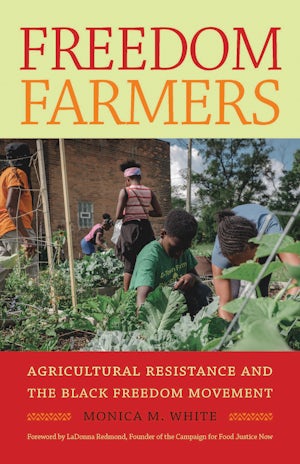Rx #7: Plant and Herbal Books by Black Authors
Previously I compiled a list of self-care and wellness books created by Black women authors and today I would like to continue with plant and herbal books from Black authors. I recently found out about Beronda Montgomery’s book Lessons from Plants, which prompted this post and searching for other similar books from the perspective of Black thinkers. (Image credit: Black People with Plants)

From her website:
Plants have strength, knowledge, and intelligence that are worthy of admiration in and of themselves…not because they affirm the ways in which we animals have those qualities.
Beronda L. Montgomery
“Dr. Beronda L. Montgomery uses “Lessons from Plants” to share plant-based knowledge and to develop and disseminate accessible lessons on the awareness and adaptability of plants. She has also recently initiated “Lessons from Microbes”.
Beronda frequently shares these using #LessonsFromPlants on her social media platforms, most frequently on Twitter @BerondaM, but also @PlantLessons. Her first book Lessons From Plants is due in April 2021 published by Harvard University Press.”
Working The Roots: Over 400 Years of Traditional African American Healing by Michele Elizabeth Lee

African American traditional medicine is an American classic that emerged out of the necessity of its people to survive. It began with the healing knowledge brought with the African captives on the slave ships and later merged with Native American, European and other healing traditions to become a full-fledged body of medicinal practices that has lasted in various forms down to the present day…Divided between sections on interviews of healers and their stories and a comprehensive collection of traditional African American medicines, remedies, and the many common ailments they were called upon to cure, Working The Roots is a valuable addition to African American history and American and African folk healing practices. (Via GoodReads)
Handbook of African Medicinal Plants by Maurice M. Iwu

This was important for me to find especially after sitting in an herbalism class on phytochemistry and learning that an important plant and herbal resource left out African-based plants.
“With over 50,000 distinct species in sub-Saharan Africa alone, the African continent is endowed with an enormous wealth of plant resources. While more than 25 percent of known species have been used for several centuries in traditional African medicine for the prevention and treatment of diseases, Africa remains a minor player in the global natural products market largely due to lack of practical information. This updated and expanded second edition of the Handbook of African Medicinal Plants provides a comprehensive review of more than 2,000 species of plants employed in indigenous African medicine, with full-color photographs and references from over 1,100 publications.The first part of the book contains a catalog of the plants used as ingredients for the preparation of traditional remedies, including their medicinal uses and the parts of the plant used. This is followed by a pharmacognostical profile of 170 of the major herbs, with a brief description of the diagnostic features of the leaves, flowers, and fruits and monographs with botanical names, common names, synonyms, African names, habitat and distribution, ethnomedicinal uses, chemical constituents, and reported pharmacological activity.The second part of the book provides an introduction to African traditional medicine, outlining African cosmology and beliefs as they relate to healing and the use of herbs, health foods, and medicinal plants. This book presents scientific documentation of the correlation between the observed folk use and demonstrable biological activity, as well as the characterized constituents of the plants.” (Via Bookshop)
African Ethnobotany in the Americas 2013th Edition by John Rashford (Editor) and Robert Voeks (Editor)

“African Ethnobotany in the Americas provides the first comprehensive examination of ethnobotanical knowledge and skills among the African Diaspora in the Americas. Leading scholars on the subject explore the complex relationship between plant use and meaning among the descendants of Africans in the New World. With the aid of archival and field research carried out in North America, South America, and the Caribbean, contributors explore the historical, environmental, and political-ecological factors that facilitated/hindered transatlantic ethnobotanical diffusion; the role of Africans as active agents of plant and plant knowledge transfer during the period of plantation slavery in the Americas; the significance of cultural resistance in refining and redefining plant-based traditions; the principal categories of plant use that resulted; the exchange of knowledge among Amerindian, European and other African peoples; and the changing significance of African-American ethnobotanical traditions in the 21st century.” (via Amazon)
Bitter Roots: The Search for Healing Plants in Africa Paperback by Abena Dove Osseo-Asare

“For over a century, plant specialists worldwide have sought to transform healing plants in African countries into pharmaceuticals. And for equally as long, conflicts over these medicinal plants have endured, from stolen recipes and toxic tonics to unfulfilled promises of laboratory equipment and usurped personal patents. In Bitter Roots, Abena Dove Osseo-Asare draws on publicly available records and extensive interviews with scientists and healers in Ghana, Madagascar, and South Africa to interpret how African scientists and healers, rural communities, and drug companies—including Pfizer, Bristol-Myers Squibb, and Unilever—have sought since the 1880s to develop drugs from Africa’s medicinal plants.
Osseo-Asare recalls the efforts to transform six plants into pharmaceuticals: rosy periwinkle, Asiatic pennywort, grains of paradise, Strophanthus, Cryptolepis, and Hoodia. Through the stories of each plant, she shows that herbal medicine and pharmaceutical chemistry have simultaneous and overlapping histories that cross geographic boundaries. At the same time, Osseo-Asare sheds new light on how various interests have tried to manage the rights to these healing plants and probes the challenges associated with assigning ownership to plants and their biochemical components.
A fascinating examination of the history of medicine in colonial and postcolonial Africa, Bitter Roots will be indispensable for scholars of Africa; historians interested in medicine, biochemistry, and society; and policy makers concerned with drug access and patent rights.” (via Amazon)
Freedom Farmers: Agricultural Resistance and the Black Freedom Movement by Dr. Monica M. White (aka The Black Farmer’s Historian)

After the news about Black Farmers’ decades long fight against discrimination and lack of proper government funding, this book and author is important to share!
“Freedom Farmers is an incredible love letter helping Black people return to and reclaim our true agrarian, radical, collective selves. Through this important book, Dr. White brilliantly disrupts the disempowering narrative that Black communities have a painful relationship with farming and land. While Black people have suffered tremendously via exploited labor and the violence of slavery in this country, that is not the summation of our history with land. Dr. White documents important historical lessons for us and shows us what we’ve known and at times forgotten–that the land both heals and frees us. This book is an urgent reminder and an absolute must read for all of us.–Dara Cooper, National Black Food and Justice Alliance
In the late 1960s, internationally renowned activist Fannie Lou Hamer purchased forty acres of land in the Mississippi Delta, launching the Freedom Farms Cooperative (FFC). A community-based rural and economic development project, FFC would grow to over 600 acres, offering a means for local sharecroppers, tenant farmers, and domestic workers to pursue community wellness, self-reliance, and political resistance. Life on the cooperative farm presented an alternative to the second wave of northern migration by African Americans–an opportunity to stay in the South, live off the land, and create a healthy community based upon building an alternative food system as a cooperative and collective effort.
Freedom Farmers expands the historical narrative of the black freedom struggle to embrace the work, roles, and contributions of southern black farmers and the organizations they formed. Whereas existing scholarship generally views agriculture as a site of oppression and exploitation of black people, this book reveals agriculture as a site of resistance and provides a historical foundation that adds meaning and context to current conversations around the resurgence of food justice/sovereignty movements in urban spaces like Detroit, Chicago, Milwaukee, New York City, and New Orleans.” (via Monica M. White’s website)
